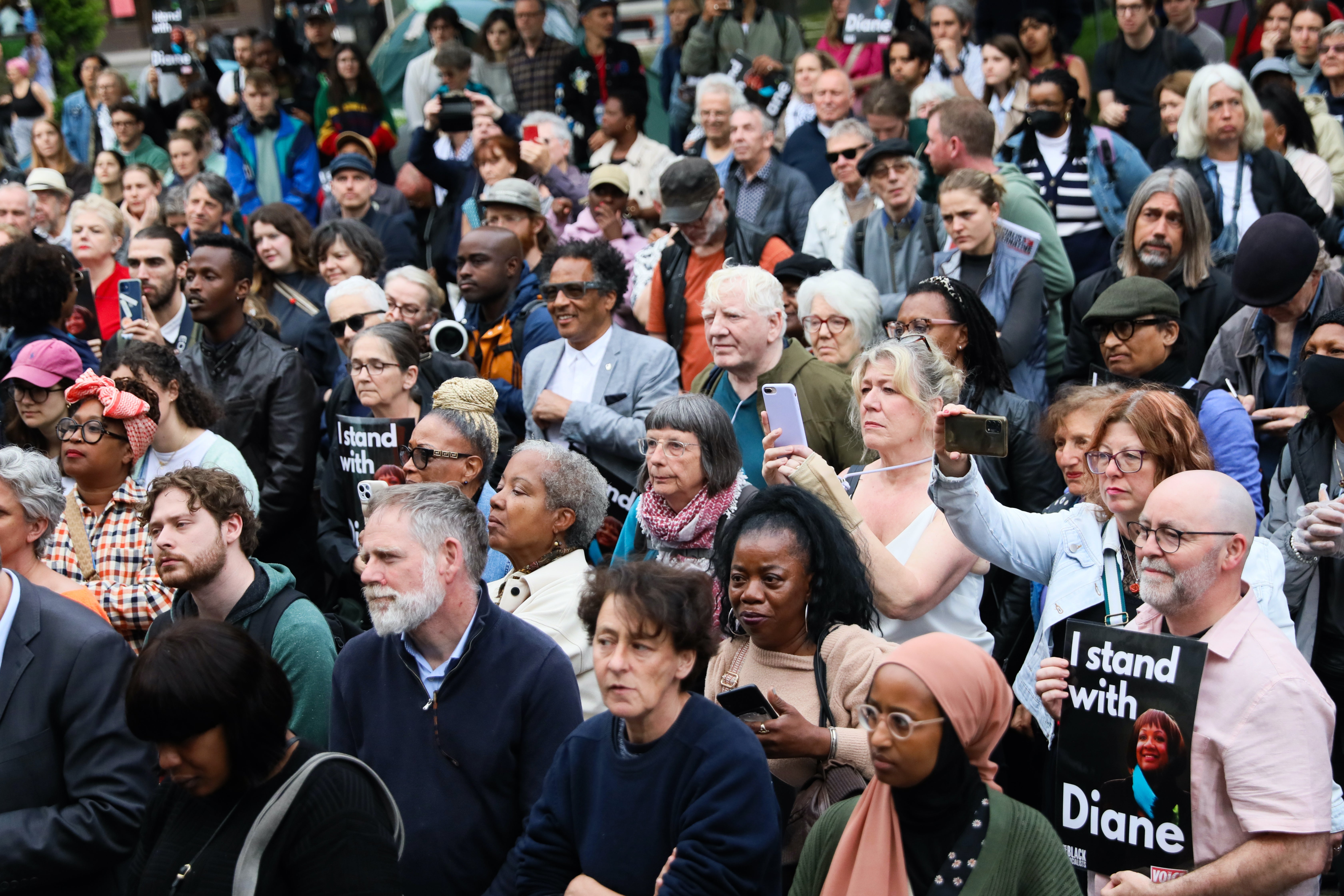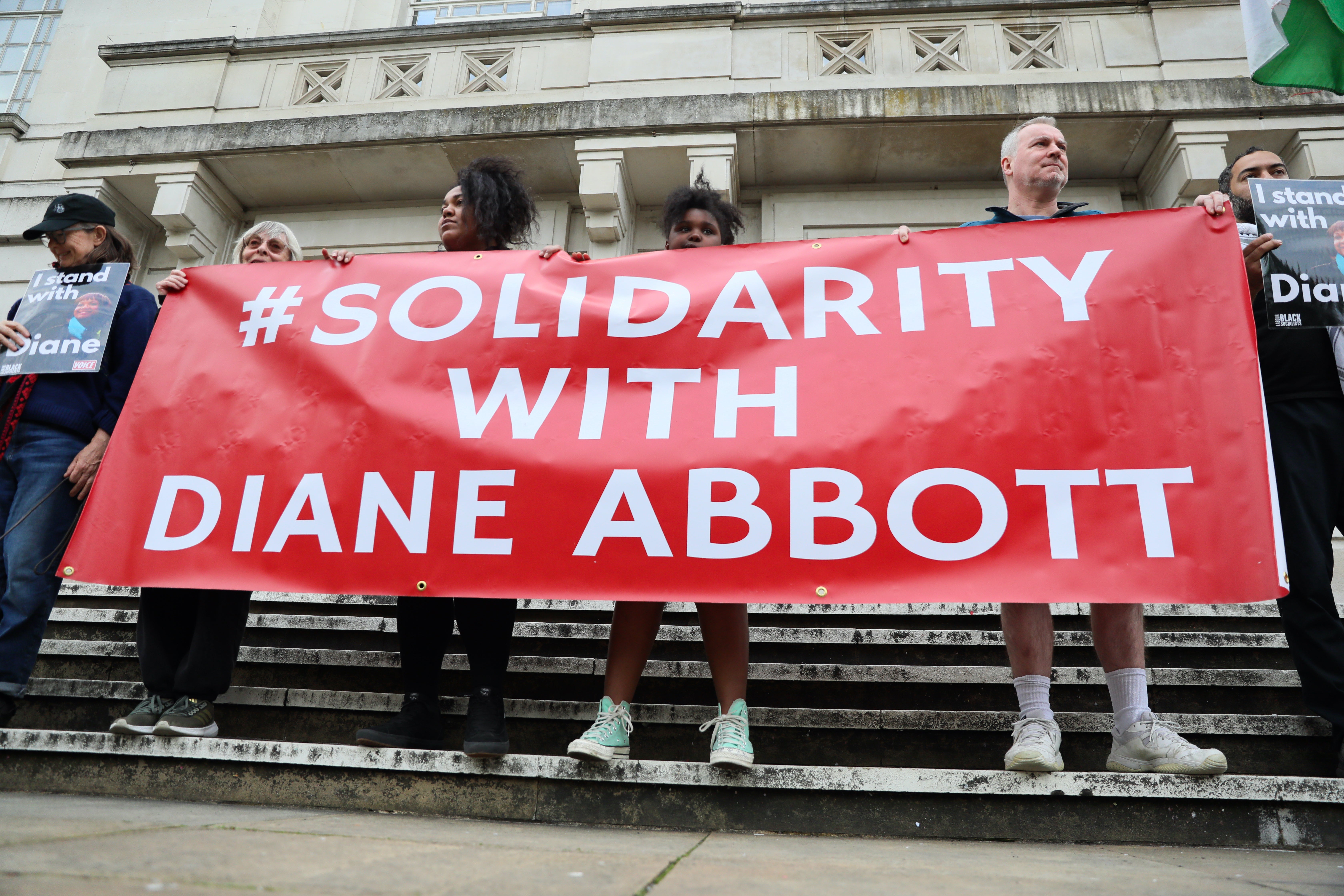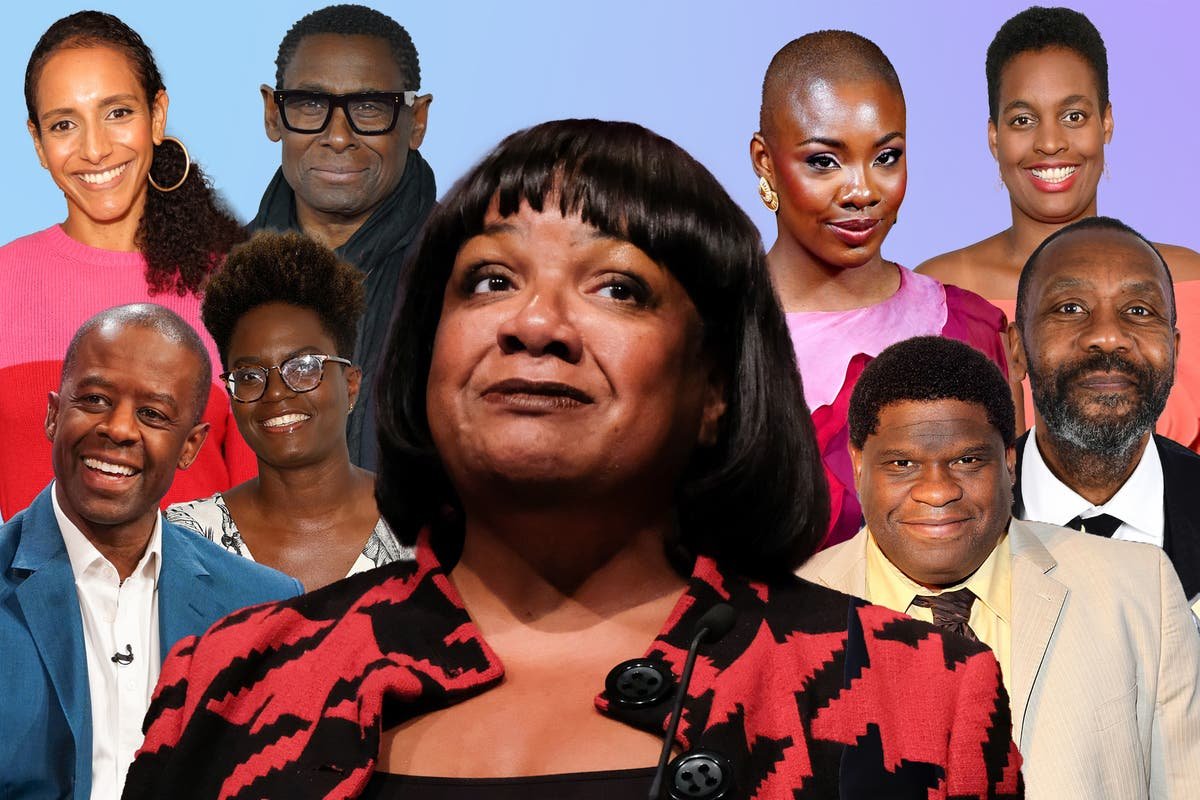As hundreds gathered outside Hackney Town Hall in east London, cries of “we stand with Diane” rang out. Among the protesters – from children to the elderly – was a red banner pledging “solidarity” with Diane Abbott, while a sign declared: “Hands off our MP.”
They had gathered on Wednesday barely 24 hours after reports that Ms Abbott, Britain’s first Black female MP, was to be banned from standing for Labour after representing the party for 37 years – derailing Sir Keir Starmer’s first week of his election campaign and deepening a rift in the party.
The news sparked calls for a demonstration online, with social media users sharing the e-flyer and others posting the #WeStandWithDiane hashtag of X/Twitter, signifying a groundswell of support.
“You have always stood with me in good times and bad and I will always stand with you,” the veteran MP told the crowd, sparking speculation that – like her ally Jeremy Corbyn – she may stand as an independent candidate.
“I promise you that as long as it is possible, I will be the Member of Parliament for Hackney North and Stoke Newington.”
The strength of feeling in Hackney has been echoed elsewhere, with dozens of prominent Black Britons signing an open letter – seen by The Independent – warning that the Labour party’s treatment of the former shadow home secretary risked alienating Black voters.
Signatories include comedian Lenny Henry, actor David Harewood, singer Heather Small, professor Gary Younge, broadcaster Afua Hirsch, director Misan Harriman, novelist Jackie Kay, author Yomi Adegoke, writer Reni Eddo-Lodge, poet Linton Kwesi Johnson, charity founder Ngozi Fulani and more.
The letter criticised the ”unfairness” of the “vindictive” treatment, adding: “It is all the more upsetting given that Black communities have been among Labour’s most loyal supporters.
”That loyalty, they said, “has never been unconditional” – and could be ruined beyond repair.

Sir Keir, for his part, has claimed that no decision has yet been taken on Ms Abbott, who had the party whip suspended over a letter to The Observer newspaper, for which she later apologised, in April last year.
But questions of a left-wing purge have only grown as Faiza Shaheen was told she had been blocked from standing for Labour in Chingford and Woodford Green after allegedly liking antisemitic posts on X.
As another pro-Abbott protest is organised for Labour HQ next Wednesday, the question for Labour is how permanent the damage is to the party’s base in the Black community.
Experts have long argued that the Black vote is not only a factor in safe Labour seats, but can play a key role in who gets the keys to Downing Street. Analysis by The Voice newspaper – Britain’s longest-running Black publication – found there were 21 Tory marginals where the Black vote could make the difference.
Activists refusing to canvas
At a time when political parties are trying to mobilise as many supporters as possible in key seats, more than one grassroots organisation has told The Independent that their activists had stopped knocking on doors and canvassing on the party’s behalf following this week’s events.
Momentum, a grassroots left-wing organisation with up to 30,000 members set up under Mr Corbyn’s leadership, said: “Already we’re seeing activists refuse to canvas and members quitting.”
A spokesperson said: “In carrying out this purge, Team Starmer is treating local communities and grassroots activists with contempt. Both Faiza and Diane were selected democratically by their local parties.
“But instead a Westminster clique has overridden their wishes, forcing out prominent women of colour for the crime of being independent-minded. The end result: a slap in the face for millions who look up to the likes of Diane, and a party grassroots which downs tools just ahead of a key election, tired of being taken for granted.”

Grassroots Black Left, a socialist organisation backed by former frontbencher Clive Lewis, said its members were increasingly supporting independent candidates rather than Labour amid the furore over Ms Abbott’s treatment, as well as other candidates.
Serious worries have also been highlighted at the heart of the Labour machine.
Mish Rahman, who sits on Labour’s National Executive Committee as a representative of local parties, said the actions suggested “rules are not applied fairly and consistently across the Labour Party”, adding: “There will be a cost for this. Communities that Labour is taking for granted will not be relied on forever as the party continues down this path.”
A lasting impact?
“The impact that I’ve been made aware of on the Afro-Caribbean vote is tremendous,” Martin Forde told Times Radio on Tuesday. The barrister’s 2022 report, commissioned by Labour, found the party had failed to tackle anti-Black racism and Islamophobia in its ranks.
“I get Whatsapp messages predominantly from Black and Asian women who are utterly dismayed by the way that Ms Abbott’s being treated,” he said.
“I’m just really surprised by the timing of all of this. In the middle of a run-up to a general election when Labour are hoping to be the next government, here was an opportunity, it seems to me, for them to show they can be fair and even-handed.”
The probe highlighted how private WhatsApp conversations between officials revealed the use of insults to describe senior Black MPs and officials, including senior MP Diane Abbott who was referred to as “repulsive”.

The Forde report carried 165 recommendations including behaviour changes at all levels of the party and the introduction of an disciplinary system for Labour members who lodge discrimination complaints to ensure a fair and independent process.
Labour confirmed in January that 154 recommendations have been completed while a further 11 were considered but not actioned, such as the use of blind cvs during recruitment processes.
Mr Forde has repeatedly recently urged Labour to do more to improve its culture.
And Lord Simon Woolley, a crossbench peer who founded Operation Black Vote, said that through the treatment of Ms Abbott, the party risked delivering a “slap in the face for Britain’s African and Caribbean communities”.
On Wednesday, he told BBC Radio 4’s World At One programme: “This is a very big moment, I would argue, for the Labour Party, and Diane, and Britain’s black communities, and I think they have about 48 hours to get this right.” For many activists, it seems, the damage is done.

Felecia Phillips Ollie DD (h.c.) is the inspiring leader and founder of The Equality Network LLC (TEN). With a background in coaching, travel, and a career in news, Felecia brings a unique perspective to promoting diversity and inclusion. Holding a Bachelor’s Degree in English/Communications, she is passionate about creating a more inclusive future. From graduating from Mississippi Valley State University to leading initiatives like the Washington State Department of Ecology’s Equal Employment Opportunity Program, Felecia is dedicated to making a positive impact. Join her journey on our blog as she shares insights and leads the charge for equity through The Equality Network.




